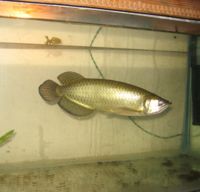Australian Pearl Arowana (Scleropages jardini)
From The Aquarium Wiki
Australian Pearl Arowana
Scleropages jardini
946 Litres (250 US G.)
95-100 cm (37.4-39.4")
Freshwater
6.5 - 7.5
23 -28 °C (73.4-82.4°F)
6-16 °d
1:1 M:F
8-12 years
Family
Osteoglossidae
Contents
Additional names
- Australian Pearl Arowana, Australian Arowana, Jardini Arowana, Silver Barramundi, Northern Barramundi
Sexing[edit]
- Mature males have a longer anal fin. Males also have lower pectoral fins then females. They say that males will also have longer barbs on their mouths but that is debatable.
Tank compatibility[edit]
- A large and aggressive fish, towards both other Arowanas and other species. Either house alone in a species tank or with similar sized robust tank mates such as large Tinfoil Barbs, Clown Knifefish, Bagrid Catfish and Giant Gouramis.
Diet[edit]
- Largely carnivorous fish that will accept a wide varieties of foods. Some Jardinis can become picky and will only accept live foods. It is highly recommended that you do NOT feed them feeder goldfish. Jardinis are very susceptible to a variety of diseases and if you feed them feeder goldfish you are just upping the chance of them getting sick. Recommended foods are nightcrawlers, blood worms, meal worms, fresh fillets, and possibly shrimp.
Feeding regime[edit]
- Feed once or twice a day. Can be fed less frequently as they mature.
Environment specifics[edit]
- Jardini Arowanas prefer sparsely decorated aquariums. Some people will just have an Arowana in an empty aquarium but it is recommended to have some driftwood to help keep nitrates at a safe level in the aquarium. The Jardini has a bare minimum tank size of about 379-568 Litres (100-150 US G.). Some people say that they need bigger aquariums but really they are the smallest of the Arowana species and usually will get to be about 61cm (24") in aquariums, so volume is less important than the dimensions of the tank, the fish needs to be able to turn around and swim.
Behaviour[edit]
- One of the more aggressive of the Arowanas.
Identification[edit]
- Similar to Scleropages leicharati and Scleropages formosus, the back of the fish is dark in colour, a brown-silver, while the flanks are a lighter silver. The front of each scale is grey, while the rear of it is silver to orange. This species develops an orange cast as it ages. The fins are dark grey with some orange spots.
Pictures[edit]
Videos[edit]
External links[edit]
- Fishbase (Mirrors:
 )
)
